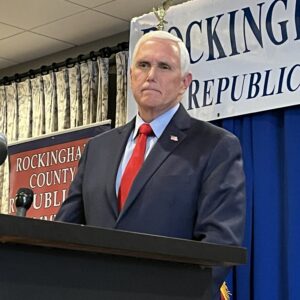One’s unknown, the other is unpopular. And they both want to be president of the United States.
On Wednesday, North Dakota Gov. Doug Burgum and former Vice President Mike Pence both announced they are entering the GOP presidential campaign. The two start at very different places on the political map, but they have one thing in common.
Both are considered long shots (at best) to win their party’s nomination.
As Donald Trump’s vice president, Pence becomes the first modern “veep,” former or sitting, to challenge his boss. The most recent example of anything similar was when sitting Vice President John Nance Garner challenged his boss, President Franklin D. Roosevelt, for the 1940 Democratic nomination as the latter ran for an unprecedented third term.
In the modern era, Pence joins Alben Barkley, Richard Nixon, Hubert Humphrey, Walter Mondale, George H. W. Bush, Dan Quayle, Al Gore, and Joe Biden as elected vice presidents who later ran for president in their own right. Six won their party’s nomination.
Historically, serving as vice president typically means promising prospects for a future presidential run. But as events currently stand, Pence’s prospects appear to be anything but promising.
According to national polling averages collected by FiveThirtyEight of sitting and former vice presidents in presidential primary polls from January to May of the year before the primary (starting in 1972), Pence sits at 6.8 percent support.
For context, Mondale, Bush, Gore, and Biden each had polling averages above 30 percent at this time. In fact, Pence’s closest counterpart in the polls is Dan Quayle. Running for the Republican nomination in 2000, the former vice president had a polling average of 7.1 percent at this time in the race. He dropped out in September 1999, four months before the Iowa caucuses.
Why does Pence face such an uphill battle compared to other vice presidents of the past? January 6.
The January 6 riot at the U.S. Capitol was the turning point for Pence’s future in the GOP. He ignored Trump’s wishes and chose not to obstruct the certification of electoral votes for president, allowing Joe Biden’s victory to be confirmed. According to Civiqs, which tracks favorability ratings of major political figures nationally, 86 percent of Republicans viewed Pence favorably on January 5 – the day before the riot. He had a net favorability (those with a favorable opinion minus those with an unfavorable opinion) of 77 percent.
Two days later, his favorability rating dropped 24 points to 62 percent, for a net favorability rating of 40 percent in the same poll. Since then, his favorability among Republicans has continued to decline, currently sitting at 37 percent, with 44 percent viewing Pence unfavorably, according to Civiqs.
Pence faces an even bigger hurdle in New Hampshire. How will a very secular, pro-choice state receive the Christian, pro-life Pence? Early polling suggests not well.
According to the UNH Survey Center’s Granite State Poll, a States of Opinion Project, Pence had 3 percent support among likely Republican voters in April. Even more daunting, only 18 percent of likely Republican voters viewed him favorably, compared to 54 percent who viewed him unfavorably. His net favorability was one of the lowest among the pool of declared and likely candidates: -36 percent.
How much can we attribute these poor favorability ratings to Pence’s actions on January 6 versus his pro-life stance and strong religious beliefs?
“It’s both,” according to Andy Smith, UNH Political Science Professor and Director of the UNH Survey Center. “He’s got some difficulties. First off, he antagonized the MAGA folks, and he’s not likely to get those people back.”
It doesn’t seem like Pence is trying to avoid drawing attention to his actions on January 6. The WIFI password to his first campaign event in Des Moines, Iowa, was “KeptHisOath!” In his campaign announcement speech, Pence said, “President Trump was wrong then, and he’s wrong now…Anyone who puts themselves over the constitution should never be president of the United States, and anyone who asks someone else to put them over the constitution should never be president of the United States again.”
Smith noted Pence will have to perform a balancing act, that he will have to “split the difference between being pro-Trump and anti-Trump, and hope to get some [MAGA] folks back.”
“He went from being just the vice president to being the enemy. He became the enemy of MAGA. He’s in a tough spot.”
Asked how a Pence campaign will be received in New Hampshire, Smith continued, “He doesn’t speak the way Northeast Republicans do. We have a much more moderate Republican Party up here.”
So, why is Pence running? “I don’t think Pence is looking for a cabinet position because that would be a step down from the vice presidency. He’s looking to run because he thinks he can do a better job than the others who are running,” said Smith.
Next to enter the race is Doug Burgum, the billionaire governor of North Dakota.
His prospects in the race are unknown because he is essentially unknown, both nationally and in New Hampshire. Pundits agree he has been a successful and popular governor of the Rough Rider State, but North Dakota also ranks fourth from the bottom in population, with just 775,000 people.
“Of course they haven’t heard of him in Salem,” one GOP strategist told NHJournal. “They haven’t even heard of him in South Dakota.”
But GOP consultant Dave Carney told NHJournal it would be a mistake to overlook Burgum. “He’s got potential. Don’t dismiss him.”
Burgum also has an estimated net worth of more than $1 billion, which doesn’t hurt.
And longtime New Hampshire politico Tom Rath said he was very impressed by the introductory video Burgum released Wednesday, calling it “the best video I’ve seen” this cycle.
“I don’t know what that cost him, but he got his money’s worth,” Rath said.
And with unpopular figures like Pence and former N.J. Gov. Chris Christie entering the race this week, there may be more upside to being virtually unknown among Republican voters than being well-known and disliked by them.
“Being unknown certainly gives you room for growth,” said Smith. And Smith acknowledged the advantages of Burgum’s personal wealth, saying, “Any number that starts with a ‘b’ is pretty good for a campaign. You’re in great shape compared to other people.”
Burgum’s campaign looks to focus on the economy, his campaign touting him as “a new leader for our changing economy.”
Both Pence and Burgum will be in the Granite State this week. Pence will hold his first New Hampshire event since announcing his candidacy on Friday, June 9 at the LaBelle Winery and Event Center in Derry (doors open at 9:30 a.m.). Burgum will speak at the Hillsborough County GOP Flag Day Picnic in Milford starting at 1:00 p.m.
For more information about these and other campaign events across the state, please check out NHJournal’s FITN 2024 calendar: https://nhjournal.com/fitn2024/.





